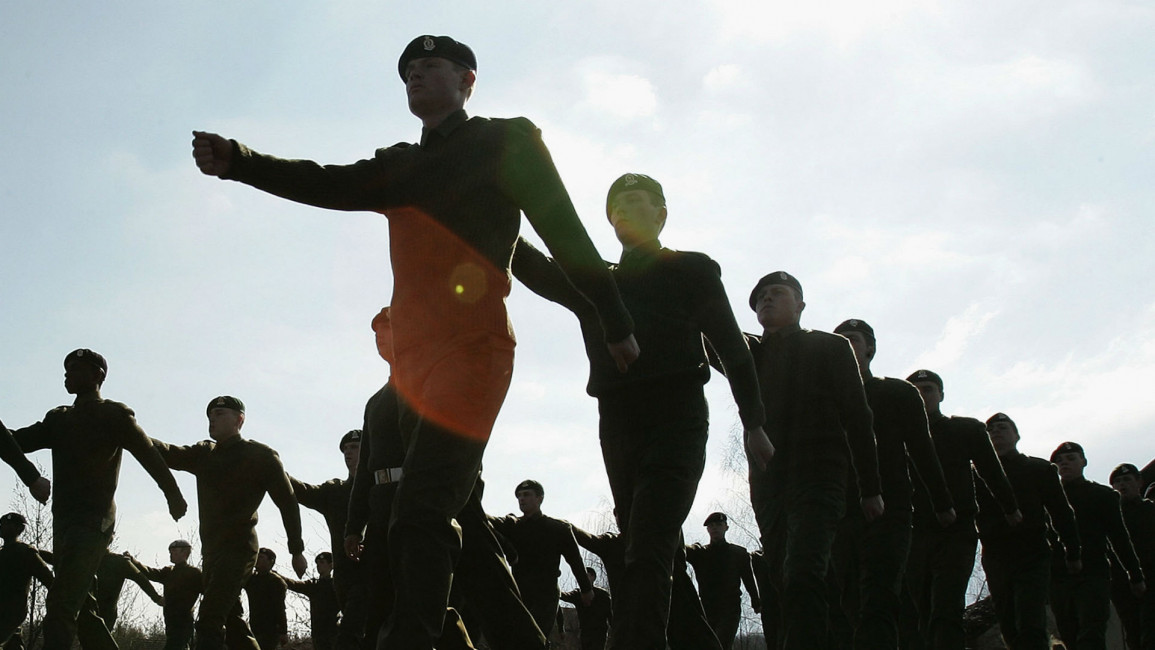
Select committees, selective memories
Select committees, selective memories
Comment: By banishing history from decision-making, British officials are free to recommend the march to yet another war.
5 min read
British troops will likely bolster US forces - in this war and future wars [Getty]
The latest UK government report on the Islamic State group makes for depressing reading.
Officials sitting on parliament's Defence Select Committee used a former name to describe the group (IS, also known as Isis) in its publication The situation in Iraq and Syria and the response to al-Dawla al-Islamiya fi al-Iraq al-Sham (DAESH).
Together with the earlier parliament resolution to participate in the US-led air campaign, and President Obama's request of the US Congress for the legal authorisation of military action in Iraq and Syria, based on scaled up bombing and special forces deployment, the report - published at the end of January - is about adding the last touches of make-up to beautify an ugly, long-term war on Iraq.
We are told in school - and throughout life - how important it is for us as individuals to learn from our mistakes. But that seems not to apply to governments, even though their mistakes are far more damaging to the people they are supposed to represent, as well as to whole nations and regions thousands of miles away.
Damage measured in lives and limbs lost, in trust shattered again and again, in reactions of vengeance and madness, in terrorism and long-term destruction that cannot be kept local in our age of globalisation.
The illusion of democracy
So, how exactly do authoritative and democratically accountable parliamentary bodies manage to make disastrous decisions that follow the Bush and Blair line of "war as an only option", given the predominate anti-war sentiment in Britain?
The simple trick, a basic lesson for us often accused of not carrying the gene of democracy, tells us it lies in keeping to a facade of balance - while selecting who to listen to as witnesses, and selecting facts without history. History, no matter how recent, has to be avoided.
| The report steps lightly over human rights abuses inflicted on Iraqis over a decade by US-led occupation troops. |
While again citing the defence of the people of Iraq against "the barbaric acts of Isil [another name given to IS]" as one of the main reasons to justify why "the House of Commons authorised the UK government to carry out airstrikes in Iraq", the report steps lightly over human rights abuses inflicted on Iraqis over a decade by US-led occupation troops and proxy regimes in Baghdad.
Forgotten are all the analyses on how those brutalities and the suppression of peaceful protests inflamed the resistance, or the cycle of atrocities of the past few years.
The committee, in its conclusion and recommendations, echoes the US administration and media propaganda focusing on the symptoms rather than causes of the bloodshed now engulfing Iraq.
In an attempt to obliterate our memory, we are told that history of violence and humanitarian crisis starts on 10 June 2014, the day when Mosul city fell under the control of he IS group.
All heinous crimes - no less barbaric than those of the IS group - committed before that day have been forgotten. The illegal detention of thousands of women and the subjection of many to torture and ill-treatment, including the threat of sexual abuse, become mere "mistakes" no longer worth recalling.
Short-term thinking
With hardly any mention of the reasons behind the collapse of the Iraqi state - the ever-growing weeds of sectarianism, corruption, collective punishment, the use of barrel bombs, or the humiliation and forced displacement of 1.9 million Iraqis - the report focuses on a broader "comprehensive approach", which includes intelligence, special forces, and diplomacy, not forgetting to highlight the "modest cost" involved.
| Democracy never ceases to amaze us. |
There is also selection of witnesses. You might think that when a government is leading an inquiry or writing a crucial report on a country to decide the life and death of perhaps hundreds of thouands of citizens it would at least include few voices belonging to citizens of that country.
But democracy never ceases to amaze us. The long-delayed Chilcot Inquiry into Britain's involvement in the occupation of Iraq has no Iraqi witnesses - and first among the "Iraq experts" from British universities and the military listened to be the Select Committee on Defence was a 22-year-old researcher, "who makes a living tracking extremists online".
Researcher Aymenn Jawad al-Tamimi has become favoured in Israeli and US neocon circles, and they have now recruited him to one of their think tanks, the conservative-leaning Middle East Forum.
| US wars in the Middle East are here to stay. Read Said Arikat's commentary here |
'Balance'
The committee did have some sane advice.
One testimony was from Dr Douglas Porch, who "suggested to us that the best policy was, in fact, to refrain from any intervention in Iraq or Syria".
"In his opinion," the report reads, "every time the West had intervened in a crisis since the 1980s, it had made the situation worse with the result being the creation of power vacuums, ungoverned spaces and the alienation of the local population. He suggested that, in this case, the campaign of airstrikes would result in collateral damage, the legitimisation of [IS], the radicalisation of the local population and an increase in the number of foreign fighters".
A statement by a group of Iraqi women on human rights and accountability was also sent to the committee.
So, having ticked the box for "balanced input", the committee, of course, chose to ignore both the Iraqi women and Dr Porch - and carry on doing what it was going to do anyway - recommend yet another war.



